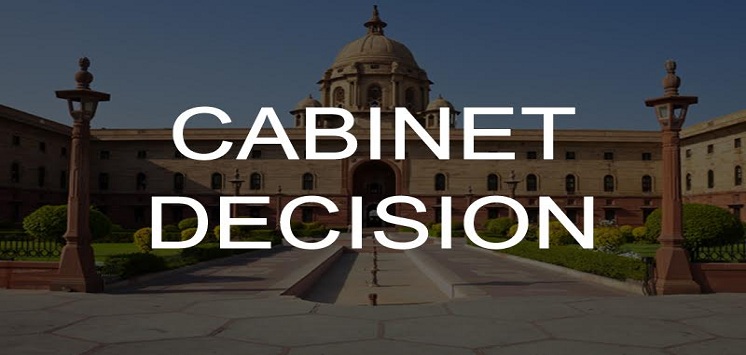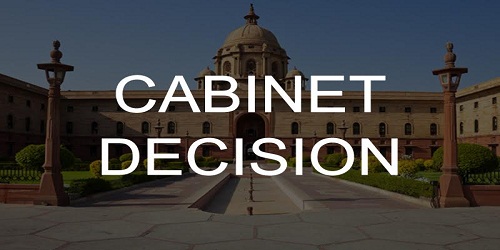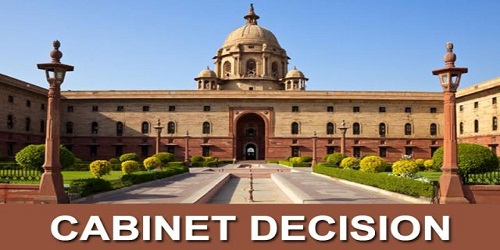On 7th March 2018, Union Cabinet chaired by Prime Minister Narendra Modi approved the following initiatives:
Cabinet approves the Arbitration and Conciliation (Amendment) Bill, 2018:
The Union Cabinet has approved the Arbitration and Conciliation (Amendment) Bill, 2018 for introduction in the Parliament. The Amendments in the Act of 1996 will help in improving institutional arbitration and establish Alternative Dispute Resolution (ADR) mechanism in India.
Some important features of this bill are:
- It will enable fast appointment of arbitrators through designated arbitral institutions by the Supreme Court or the High Court, eliminating the need to approach the court.
- It provides for setting up of an independent body namely the Arbitration Council of India (ACI) which will grade arbitral institution and accredit arbitrators by laying down norms.
Cabinet approves two percent Dearness Allowance to Central Government employees:
The Union Cabinet has approved to release an additional instalment of Dearness Allowance (DA) to Central Government employees and Dearness Relief (DR) to pensioners with effect from 01.01.2018 corresponding an increase of 2% over the existing rate of 5% of the Basic Pay/Pension, to compensate for price rise.
- This will benefit nearly 48.41 lakh Central Government employees and 61.17 lakh pensioners.
- The combined impact on the exchequer on account of both Dearness Allowance and Dearness Relief would be Rs.6077.72 crore per annum and Rs.7090.68 crore in the financial year 2018-19.
- This increase is in accordance with the recommendations of the 7th Central Pay Commission.
Cabinet approves Recommendations of Inter-Ministerial Group on Stressed Assets in Telecom Sector:
The Union Cabinet has approved two important measures in telecom sector to facilitate investments, consolidation in the sector and improving ease of doing business.
Restructuring of Deferred Payment Liabilities of telecom Service providers for spectrum
- By giving one-time opportunity to opt for higher number of instalment (maximum 16 instalment) apart from currently permitted 10 instalments.
- The increased instalment is based upon the principle that the Net Present Value (NPV) of the Payment Due is protected as per respective notice inviting application for auction of spectrum from 2012.
- The total amount received will be higher by Rs. 74446.01 crore till 2034-35.
Revision of limits of cap for spectrum holding
Based on recommendations of TRAI and Telecom Commission, the Cabinet approved the revision of limits of cap for spectrum holding as follows:
- The overall spectrum cap is revised from the current limit of 25% to 35%.
- The current intra-band cap is eliminated.
- A cap of 50% on the combined spectrum holding in the sub-1 GHz bands (700 MHz, 800 MHz and 900 MHz bands) has been introduced.
- There will be no cap for individual or combined spectrum holding in above 1 GHz band.
Cabinet approves continuation of Swatantra Sainik Samman Yojana (SSSY) during 2017-2020:
The Union Cabinet has approved the continuation of Swatantra Sainik Samman Yojana (SSSY) during 2017-2020 beyond the 12th Five Year Plan which ended on 31/03/2017.
- This approval provides for a monthly Samman Pension to freedom fighters, and after their death it will be provided to their eligible dependents.
- The financial implication for continuing SSSY during 2017-2020 will be Rs. 2552.93 crore.
Cabinet approves a Memorandum of Cooperation between India and France in the field of environment:
The Union Cabinet has approved signing of a Memorandum of Cooperation between India and France in the field of environment.
- The Memorandum of Cooperation will enable establishment and promotion of closer and long-term cooperation between India and France in the field of environment protection and management of natural resources based on equity, reciprocity and mutual benefits, considering related laws and legal provisions in both countries.
- It will bring in latest technologies and best practices to improve environment protection, conservation, management of climate change and wildlife conservation.
Cabinet approves agri mechanisation promotion for crop residue management:
The Cabinet Committee on Economic Affairs has approved for promotion of Agricultural Mechanization for in-situ Management of Crop Residue in Punjab, Haryana, Uttar Pradesh and NCT of Delhi.
- The total outgo from the Central funds will be Rs. 1151.80 crore (Rs. 591.65 crore in 2018-19 and Rs. 560.15 crore in 2019-20).
Components of the scheme are:
- Establish Farm Machinery Banks for Custom Hiring of in-situ crop residue management machinery.
- Financial assistance at 80% of the project cost will be provided to the cooperative societies of the farmers, FPOs, Self Help Groups, Registered Farmers Societies/ Farmers Group, Private Entrepreneurs, Group of Women Farmers.
- Financial assistance at 50% of the machinery/ equipment will be provided to individual farmer for crop residue management.
- Information, Education and Communication for awareness on in-situ crop residue management.
- Financial assistance will be provided to the State Government/ KVKs, ICAR Institutes, Central Government Institutes, PSUs, etc. for the activities to be done on information, education and communication.
- Respective State Governments through District Level Executive Committee (DLEC) will identify various beneficiaries and location.
- The State Nodal Department / DLEC may tie up with the Banks for credit requirements of the beneficiaries.
- At the Central level the scheme will be administered by Department of Agriculture, Cooperation and Farmers Welfare.
- At the State level the nodal implementing agency will be the Department of Agriculture of the concerned State Government.
- The District Level Executive Committee will be responsible for taking forward the objectives of the scheme for project formulation, implementation and monitoring in the districts and will constitute Surveillance Committees involving farmers group.




